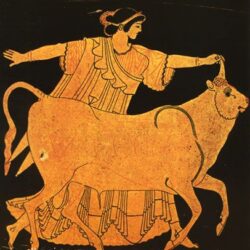After reading “Taking the Veil” and viewing the blog “I, Too, am Oxford”, I noticed recurring themes of religious oppression. In “Taking the Veil”, Kramer discusses Djamila Benrehab and her experience with being veiled in France. In particular, the quote “‘made my choice. . . to announce my identity,'” stood out to me because it accentuates that Benrehab chose to wear a veil in accordance with her Islamic faith (Benrehab, 59). Similarly, the second to last photo on the “I, Too, am Oxford” blog caught my attention because in the picture, a Muslim woman is stating “I’m not oppressed,” and “hijab is my choice” (“I, Too, am Oxford”, 2014). This led me to think about ideas of religious oppression in countries that claim to support the right to religious freedom. In France’s case, “unveiling” women was the idea of a majorly Christian society to seemingly “undo” the oppression of women and promote feminism. However, it seems that they did not take into consideration the women themselves that they were unveiling. The same can be said in Oxford’s case, as the woman in the second to last picture reveals that people’s preconceived notions about oppression and the veil do not line up with her personal beliefs. All in all, is it more oppressive to force someone to remove a religious article or symbol and to disregard the meaning behind it? In countries that claim to have religious freedom, why are some religions valued over others? For example, why is wearing a hijab or other covering considered oppressive, while wearing a cross necklace is not? I think these questions are important to ask ourselves to unpack years of religious discrimination. Also, it is important to remember that even if we are not followers of a certain religion, under a political policy that supports religious freedom, we must treat everyone with consideration and respect regardless of their faith or lack thereof.

Europe’s Long 20th Century (HIS270 S21)
A Contentious Continent
I enjoyed reading this because you brought up the parallels of the religious bias and what is considered oppressive and what is not. I think it is important to consider the ideals that different kinds of people follow. In response to the question of religion and an article, disregarding meaning of something important to someone is where I find a true problem with belief. By forcing your own beliefs upon someone, you find yourself in a position of power and that is both dangerous and represents the true definition of oppression.
Very interesting post you have here. I think forcing someone to remove an item of religious clothing is definitely oppressive. However, at the same time, organizations do have the right to say that certain conspicuous religious clothing cannot be worn. But then again, just because you have the right to do something, doesn’t mean it’s morally correct. If someone is simply expressing their religion without harm to others, then it’s certainly fine for them to wear religious clothing. Inevitably, in many parts of the world, certain religions are favored over others. I think this is because that particular religion conforms more to the traditional norms of the country’s culture. This is something that we cannot practically eliminate, because bias is innate to people. The only way to eliminate such a thing would be to live in a homogenous utopia.
I want to agree with Nicholas. Just because businesses and schools have the right to deny a student to wear certain clothing or accessories does not mean that they should. In my opinion, a child/teacher should be allowed to wear whatever they want that expresses their religion as long as it is not offensive, though it is difficult to set the boundary of what is offensive and what is not.